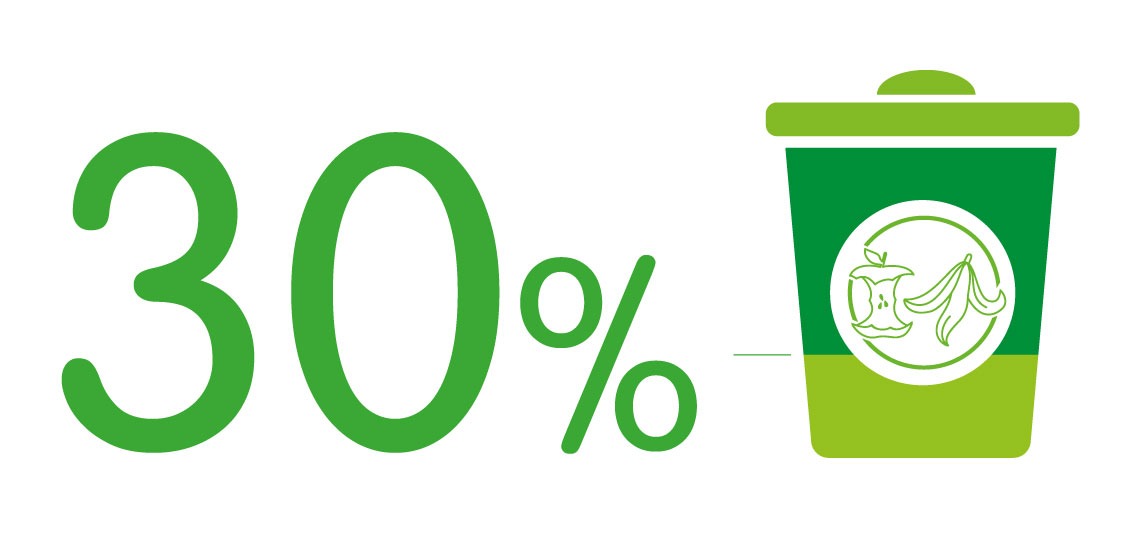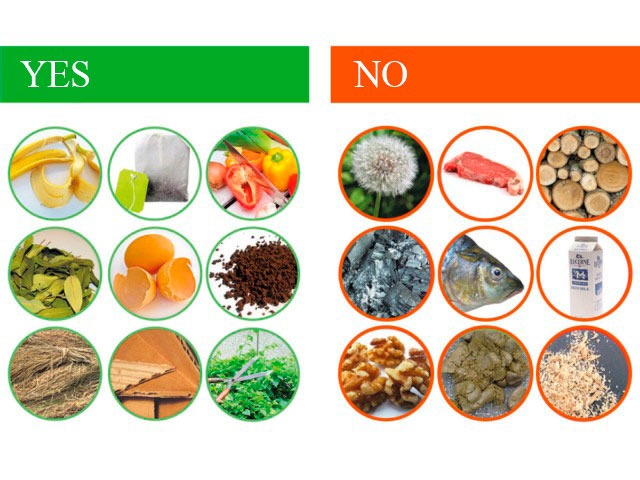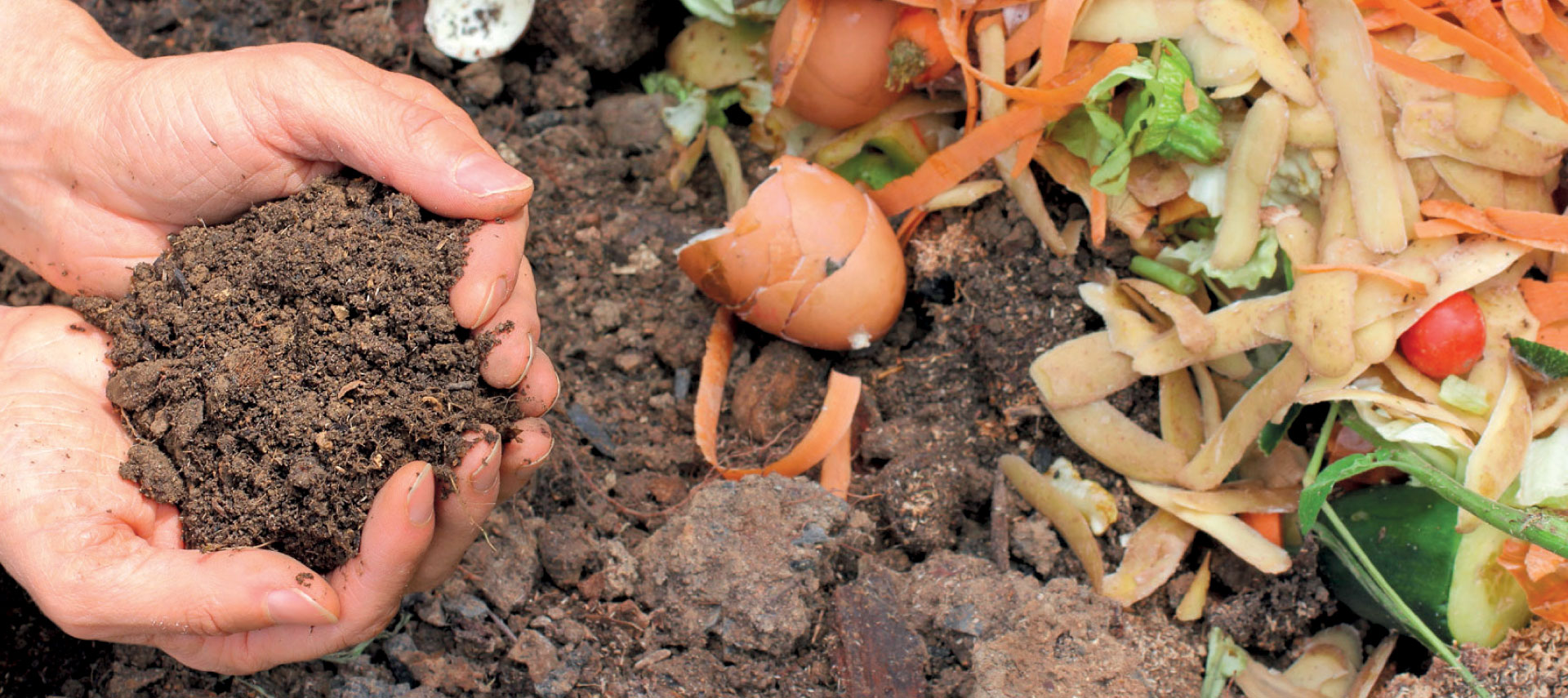COMPOSTING is the oldest method of waste recycling. Composting is the process of organic matter decomposition under the influence of microorganisms under aerobic conditions, whereby COMPOST is formed as the final product.
Why composting?
Organic waste accounts for over 30% of total household waste. Therefore, by separating organic waste, we save landfill space and do not pollute our environment unnecessarily. Inadequate disposal of green waste encourages putrefaction processes, which leads to the creation of unpleasant odours. In addition, burning green waste causes double harm – it wastes oxygen and prevents the return of nutrients to the soil.
Composting from organic waste creates valuable organic substances that improve soil structure, help retain moisture, improve soil aeration, increase the microbiological activity of the soil, make it nutrient-rich and improve plant resilience to pests and disease.

Composting process
In composting, biowaste is aerobically decomposed to produce carbon dioxide, water, heat and COMPOST as the final product.
The composting process takes a relatively long time, from 10 to 12 months, and occurs in three main stages:
1 Decomposition stage
The main role is played by microorganisms (bacteria, etc.). They are the first to attack the composting material and decompose it, releasing large quantities of heat (up to 70ºC per 1 m³ of compost mass) which destroys weed seeds and pathogens.
2 Conversion stage
The temperature decreases, the number of microorganisms increases, and the compost mass is populated by the first fungi, mould, yeast, etc.
3 Construction stage
The first multicellular organisms (e.g. earthworms) appear, which mix and break up the material and which, through digestion, create the so-called compost lumps.
Where to compost?
Composting does not require much space. It can be done in the garden or, using a suitable composter, even on the balcony. The composting site in the garden must be protected from strong wind and sun. Composting can be done in a pile enclosed by wood or brick, or in special containers.
What to compost?
CARBON-rich biowaste: grass clippings, leaves, withered flowers, weeds, shredded twigs, charcoal or wood ashes, …
NITROGEN-rich biowaste: raw vegetable scraps, potato peels, fruit scraps, citrus peels (shredded), coffee grounds, tea residues, egg shells, …
DO NOT COMPOST: seeded weed plants, walnut leaves, diseased plants, cooked food scraps (attracts rats), meat, bones, large amounts of newspapers, colour magazines, diapers, faeces, tobacco residues, vacuum cleaner bag contents, and hard coal ashes.
Due to the slow and difficult decomposition, it is not recommended to dispose of cork bottle tops, walnut shells, pine cones and bones in the compost. Never compost waste that contains chemicals, such as old medicines, oils, plastic packaging, stained sealed wood and Styrofoam…

How to compost?
1 Shred
Shred organic waste to decompose more easily.
2 Mix
Mix nitrogen-rich organic waste (decomposes faster and provides moisture) and carbon-rich organic waste (decomposes more slowly and provides aeration) in approximately equal shares.
3 Prepare and protect the pile
Put the material on a pile (it is desirable to spread a layer of twigs on the bottom for aeration) and protect it from too much sun or rain. This is done with a thin layer of soil, a layer of dry grass, leaves, hay, jute bags or cardboard. Do not cover with plastic bags.
4 Aerate
Turn the pile occasionally (at least once a month) to ensure aeration, because the air is necessary for the growth and development of organisms in the compost and it prevents the occurrence of unpleasant odours. THE PILE MUST NEVER BE COMPACTED.
5 Check moisture level
Check the moisture level of the compost – take a handful of compost material deep from the pile and squeeze it gently. If liquid drains from the hand, there is too much water. If no moisture is felt in the clenched fist, there is not enough water. If the material in the hand forms a lump, the moisture level is adequate. The compost may need adding of water occasionally in the summer and protection from excessive moisture in the winter.
6 Mix into the soil
After 9-12 months, when the compost becomes loose, dark in colour and takes on a specific forest floor scent, we should mix it into the soil of our garden or house plants.
Important / additional tips:
- We never put composting material in a hole in the ground, because the lack of oxygen will lead to putrefaction and unpleasant odours
- We do not place the composting site on stone, concrete or any other impermeable surface
- The compost pile must be in direct contact with the soil so that the microorganisms from the soil can have unimpeded access to the composting site
- Grass clippings should be put on the pile in a very thin layer to avoid the risk of rotting. Leave the cut grass to dry beforehand
- Organic waste should be shredded and mixed, and each deposited layer can be sprinkled with garden soil or ready-made compost. This will accelerate the decomposition process of the compost material
Problems and solutions
MY COMPOST PILE STINKS!
There is not enough oxygen or too much nitrogen. Turn the pile to allow aeration and add some dry material to absorb moisture (e.g. twigs, dry leaves)
MY WASTE IS NOT DECOMPOSING / NOTHING IS HAPPENING!
Patience please! It takes about a year to produce mature compost. In cold weather, living organisms (bacteria) are less active.
THE PILE IS TOO DRY!
Sprinkle the pile with water but be careful not to overdo it. Excessive amounts of water will close the airways, causing aerobic organisms to die, which will suspend the composting process.
THE PILE IS TOO WET!
Turn the pile and add material that will absorb excess moisture (e.g. sawdust, dry leaves)
MY PILE IS ATTRACTING INSECTS!
Insects play an important role in composting. However, if flies are gathering excessively, there may be meat scraps in the pile, which should be avoided! It is also advisable to cover vegetable and fruit scraps with a thin layer of soil or leaves.
Sources:
www.mzopu.hr
www.ponikve.hr
www.fragmenti.com


You must be logged in to post a comment.